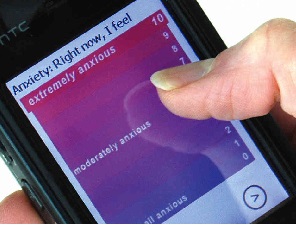Is There Really an App for That? – Therapy Apps for Depression and Anxiety
Is There Really an App for That? – Therapy Apps for Depression and Anxiety

In a recent article, USA Today explored the growing field of apps targeted towards mental health and mental health treatments. The article claimed that millions of Americans are turning to apps to provide therapy treatments and explored the usefulness of such resources for improving mental health.
The article raised two separate, but related, issues with regards to the potential of mobile apps to address depression and anxiety, and potentially curb suicide. First, are mobile apps effective at impacting mental health and second, can mobile apps replace traditional face-to-face treatment?
A good amount of scientific evidence suggests that mobile apps can effectively treat depression and anxiety, and some evidence is accumulating to support apps to reduce self-harm and suicidal ideation. However, the most effective apps for depression and anxiety also include some form of human interaction. In these approaches, which combine human involvement with technology, the benefits may be as large as even traditional face-to-face therapy. Such apps typically use concepts from established evidence-based practices, such as cognitive-behavioral therapy, and use human support to boost engagement, personalize strategies, or troubleshoot problems. Apps that lack human involvement often have smaller benefits and few people persist with them after initial use. These apps still have value – they can be useful as front line options in a system of care, as tools to reinforce skills after successfully ending therapy, or as an option for some form of help when barriers prevent other access. But they are not suitable replacements for therapy.
This leads to the second question; can mobile apps stand in for traditional face-to-face treatment? Currently, it does not appear that any technology alone is sufficient to replace a trained and licensed mental health professional. The USA Today article compares some current products to ride-sharing apps such as Uber or Lyft - but the process of becoming licensed to drive a car is much different from the process of becoming licensed to provide mental health services. Platforms that connect people with untrained supporters might provide some benefits but likely in the same way that a supportive friend or family member can be helpful in coping with some of the stresses associated with depression and anxiety. Platforms that incorporate trained professionals might be beneficial insofar as they might overcome issues of geographic access, travel time, or fitting therapy into a busy schedule but questions of cost remain especially as many of these platforms are not currently covered by insurance. Although some work suggests that a strong therapeutic relationship can be formed through technology, in my own experience I find that people often want some face-to-face interactions to establish a relationship before moving to technological communications. It is also very likely that some people will always prefer face-to-face interactions when dealing with sensitive issues as addressed in treatment.
In short, mobile apps have a role to play in addressing anxiety, depression, and potentially suicide, and technological options continue to expand and improve. However, consider for a second the frustration of trying to rebook an airline ticket or schedule a maintenance appointment with an automated system - now translate that to therapy to appreciate just how much further technology has to advance before technological treatments can replace face-to-face treatment. For the time being, it might be best to think about such products as “in addition to” rather than “instead of” options for mental health treatments.
Learn more about depression and anxiety mental health apps.
Photo/Image credit: https://www.jmir.org/2010/2/e10/











